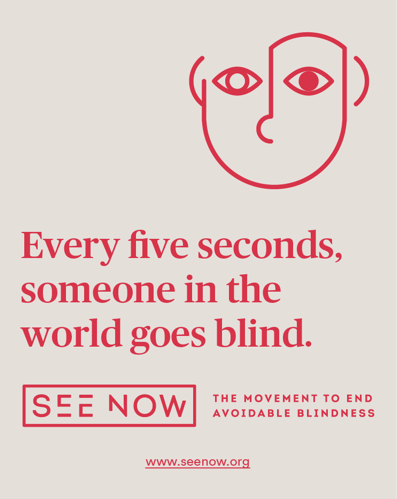Emma Cosgrove was 4 years old when she went with her father, Chad, to get his eyes tested. In the spur of the moment Chad asked the doctor to check Emma’s eyes too. He was shocked to find that Emma could not see.

After checking her eyes, the doctor turned to Chad and said that his daughter had cataracts and needed to see a surgeon.
Chad phoned Emma’s Mom, Amy. Like so many, Amy couldn’t believe that her child had cataracts, as she thought that you could only get cataracts when you were much older. But no one had ever checked Emma’s eyes before, so neither Chad or Amy had any idea about their daughter’s vision.
At this moment, Amy became very worried. “I started to make calls and not one hospital or children’s hospital would help me,” she said. “It wasn’t cancer so they didn’t think it was important.”
Days later, a doctor returned Amy’s call with the name of a surgeon and an appointment for Emma. The surgeon told them that Emma needed to have the surgery immediately, or she risked being blind for the rest of her life.
“He didn’t sugar coat it,” Amy said. Temporary lenses could not be tried due to the severity of the cataract. So an experimental implant was suggested.

During the week before the surgery, Amy was repeatedly asked how Emma’s condition was not detected sooner. But Emma had never complained about it, and not one paediatrician had suggested to get her eyes checked. Having not been treated sooner, it was critical to operate immediately or Emma’s brain would lose the plasticity for sight. This would leave Emma permanently blind.
The surgery went well, and the implant was a success. The surgeon prescribed eye drops and patches to strengthen the eye and bifocal glasses. And while the medication was extremely painful for her, the eyes fully recovered.
As Emma started kindergarten, her teachers discovered that she did not understand everything in the classroom. Although she could make sense of what the teachers were saying, she could not translate it onto paper.
Frustrated but shy and polite, Emma struggled through the whole of first grade. Tutoring was not helping, and the school refused to provide support because her eyes worked fine.
For months meetings were organised to understand and explain her incapacity to understand visual cues, but it came to no avail. Emma, a well behaved girl, was passed onto second grade even though she did not make the prerequisites.
However, the teachers were still confident her visual learning would kick in. But it came to a point when Emma was crying to school and made excuses to go see the nurse.
Nearing the end of second grade, Amy desperately contacted everyone she knew including the school board. Emma’s teacher and tutor worked hard throughout the summer to help Emma and soon enough things started to click!

She entered third grade as happy as can be. Although she is still shy and often resists participating in class, Emma is gaining in confidence.
Luckily enough, Emma was young enough to avoid permanent blindness. She is now determined to help prevent this from happening and educate parents in getting their new-born’s eyes tested every year until the age of 5.
Amy feels responsible for not getting her Emma’s eyes checked earlier, but this is more common than most people realise. Amy is not alone in raising children with eye health problems.
In fact, 1 in 4 children in the U.S. have an eye health problem. But our nation is currently facing severe cuts to vision and eye health programs that help kids like Emma.
You can help by asking your representative to save the sight of millions. Click here for an easy way to contact them directly:




